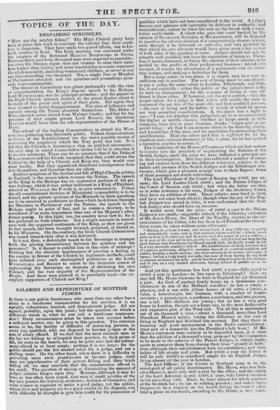TOPICS OF THE DAY.
DESPAIRING STRUGGLES.
4' How are the mighty fallen r. The High Church party have been at pains this week to convince the country that their condi- tion is desperate. They have made two grand efforts, one in Ire- land, another in Kent. The Irish meeting was convened under the auspices of the Reverend MARCUS BERESFORD at Cavan. Between thirty and forty thousand men were expected to assemble ; but even the Orange organ does not venture to state their num- bers higher than twelve, and more trustworthy accounts represent the whole assembly, including women and children, as never at any one time exceeding two thousand. Not a single Peer or Member of Parliament attended; and the speeches and proceedings gene- rally were contemptible. The dinner at Canterbury was given professedly with the view of commemorating the King's famous speech to the Bishops. Lord WINCHILSEA was its principal promoter ; and the papers in the High Church interest exulted in the grand display about to be made of the power and spirit of their party. But again they were doomed to woful disappointment. The men of influence and sagacity among the Tories absented themselves. . The Duke of WEL LI NGTON never stirred from Weimer Castle ; and but for the presence of that simple person Lord RODEN, the illustrious HATTON would have been the sole representative of the House of Pcers.
The refusal of the leading Conservatives to attend the WIN- cuILSEA gathering was discreetly politic. Violent demonstrations in favour of the Establishment are the worst possible means of recovering the popularity which the Tory party has lost. It is felt that the Church is becoming a clog on political movements: the next step in sound Conservative tactics will be to abandon it to its own resources. There can be no question that if the Duke of WELLINGTON and his friends imagined that they could storm the Cabinet by the help of a Church and King cry, they would roar most lustily. But they apprehend disastrous consequences from it to themselves, and therefore they are silent. Another symptom of the decline and fall of High Church politics in England, is the means taken to rouse the Nation. The speech of the King to the Bishops was an expression perhaps of his pri- vate feelings, which it was rather indiscreet in a King of England, situated as WILLIAM the Fourth is, to give utterance to. Unless the old constitutional doctrine of Ministerial responsibility is to be
denied, and the private opinions of the Monarch on State questions are to be received in preference to those which he delivers through his Ministers to Parliament and the Nation, the speech to the Bishops ought in point of fact, and in common decency, to be considered of no more importance than any of his Majesty's after- dinner gossip. In this light, too, the country must view it; for it has produced no fruit whatever. Not a single measure in accord- ance with the supposed sentiments of the King, as they are given in that speech, has been brought forward, promised, or hinted at, by his Ministers. On the contrary, the Irish Church Commission was issued immediately after it was delivered. Is it not, then, a downright insult to the Sovereign to trumpet forth the glaring inconsistency between his opinions and his measures? Is it decent to exhibit him in this state of tutelage ?
Nothing but the absolute hopelessness of creating a feeling in the country in favour of the Church by legitimate methods, could have induced even such shortsighted politicians as the Lords
WINCHILSEA and RODEN to resort to the desperate course of representing the Sovereign as desirous of thwarting his own
Cabinet, and the vast majority of the Representatives of the People. And these men pretend to be peculiarly loyal—the ex- emplary supporters of Church and King






















 Previous page
Previous page